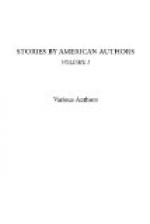“We ought to have a real artist to arrange them,” said Nina; “what would I give if old Mr. Megilp were here.”
“Did you know Megilp?” exclaimed Barwood.
“Why, of course I did. He was my drawing teacher at Richmond for years.”
“What a small world it is, to be sure,” said Barwood, giving vent to a favorite reflection. The mention of Megilp brought back for a moment a remembrance of their last meeting and conversation, and the strange pursuit into which it had led him.
The signing of the marriage contract was selected by the amateurs as an appropriate subject for illustration.
“We must have a table,” said Miss Travers. “At one side sits the notary, lifting his pen from the document which he has just signed, and at the other her father, pushing toward the notary a roll of money in payment.”
“Here you are,” said George Wigwag, taking his place and assuming the appropriate gesture; “here’s your notary; bring on your old gentleman and his money.”
“A roll of old copper cents would be just the thing,” said Miss Travers. “They look antique enough.”
“Will some gentleman deposit with the treasurer a roll of antique copper cents?” said Brown, passing a hat. “No gentleman deposits a roll of copper cents. Very well, then the wedding can’t go on.”
“Do you think I’ll sign marriage contracts for copper?” said Wigwag. “No indeed; I’m not that kind of a notary.”
“I will bring down some of papa’s curiosity coins from his cabinet,” said Nina. “I don’t believe he will scold me, just for once.”
She returned in a moment with a dozen or more silver pieces, and placed them on the table by Barwood. He began to examine them carelessly.
“I did not know your father was a numismatist,” said he.
“Oh yes,” said Nina, “he always had a great taste in that way. His collection now is nothing. When we broke up in Richmond most of it was sold off. He retained only a few of the most valuable pieces, which he keeps in a case in his room. I don’t know much about such things, for my part. Here is one that is considered curious. It was taken out of a wreck on the California coast, I believe, and was the last papa bought before his failure. I think it is Russian, perhaps, or Arabic—no, let me see”—
Barwood, with an abstracted air, took it to examine. Suddenly he uttered a strange exclamation and fell back in his chair, pale, trembling, almost fainting.
The coin was a Jewish shekel, with a cross cut through at one side.
He pleaded sudden illness, and rode hastily homeward in a state of indescribable agitation.
* * * * *
V.
YOUNG FORTINBRAS.
Barwood’s strange and almost forgotten conception was thus at length realized, and the interest with which it had inspired him intensely revived. One of the fatal pieces was found. He would now fain have overthrown the structure of probabilities which he had labored so painfully to elaborate. He reviewed step by step all the details of his former study; but no argument availed in the face of the extraordinary corroboration now offered. The piece was “stamped with a mark in shape like a cross,” and the account of Irenaeus was verified.




